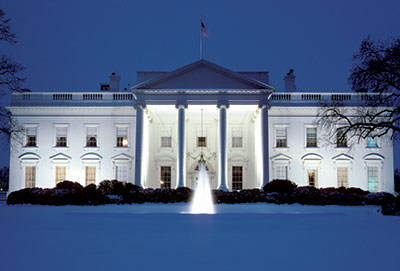What Trump’s presidency means for the golf industry

Photo: iStock.com / Thomas Wachs
Surprising all the pundits, Donald Trump has won the presidency. What does having a multi-course owner in the White House mean for the industry?
Election Day 2016, Hillary Clinton versus Donald Trump. The polls all showed the White House would be Clinton’s.
But as the saying goes, ‘That’s why they play the game.”
“I liken it to a sporting event where, going into the game, you think it’s going to be a blowout,” says Rhett Evans, GCSAA’s CEO, of the way he viewed this election. “Throughout the night things started shifting, you saw the momentum go over to the underdog, it’s like one team was making baskets and the other had gone cold. All of a sudden Trump has Ohio and Wisconsin.
“I wake up early the next morning and (Trump) pulled it off,” Evans continues. “I guess I should have stayed up for overtime.”
Even though the underdog pulled off the upset, the associations that represent golf are not unprepared. Also, they’re hopeful that a Trump administration could be a much friendlier regime for the game of golf.
A different look
Washington D.C.-based Responsible Industry for a Sound Environment (RISE) is an association that represents the specialty pesticide and fertilizer industries. Aaron Hobbs, the association’s president, says that while the water cooler talk the day after the election was mostly about the surprising Trump victory, the association itself was prepared for either candidate.
“We participated in both conventions and interacted with agriculture teams on both sides,” Hobbs says. “Regardless of what happened we were ready to work with the transition teams to make our industry known to them.”
Hobbs says it is too early to tell exactly what Trump’s win means for his members, but he says he’s hopeful because Trump’s administration is more business aware and realizes the impacts of regulations on the chemical industry.
“We feel pretty comfortable that the things we care about will get a different look under the Trump administration than we thought they would get under the potential Clinton administration,” Hobbs says. “The president-elect is a businessman. We think the tone of his administration will be a respect for business. An administration with a more intimate and personal knowledge of what regulation means to industry business will give us at least a more receptive audience to the challenges that we face and our customers face to do their jobs.”
Evans, calling this a “change election,” agrees that a Trump White House will be friendlier to the business of golf.
“I think that Clinton’s agenda vs. Trump’s agenda, when it comes to issues that we’re currently combating and working to a common solution on such as WOTUS, I think we’ll see a night and day difference,” Evans says. “If you started going down the list of those items that we are currently watching and looking after like nutrient bans, pollinator issues, pesticide regulations and water, etc., I think President Trump and his administration will be much more open to looking at the science and the facts. Some members of the current administration thought that golf was a waste of resources. I think that will change.”
WOTUS, overtime and immigration
Trump’s campaign made many promises, from building a wall on the U.S./Mexico border to “locking up” Hillary. Only time will tell what policies he pursues early on, but a few issues that directly affect golf could be reversed early on, namely Waters of the U.S. (WOTUS) as well as the new overtime rule that went into effect on Dec. 1. Meanwhile the future of immigration and the deportation of illegal immigrants remains a question mark.
“Due to our leadership being heavily engaged with the Republican Congress on WOTUS, it has been an issue that has gotten attention from the Speaker (of the House, Paul Ryan) as well as from the (Trump) campaign,” Hobbs says. “We feel pretty confident that we will get a really good look at what that means as an impact of the regulation not only on our business but the other industries that are impacted by a rule that we never supported. I can’t think of anyone who thought (WOTUS) was done well.”
Evans and the GCSAA are prepared for the Fair Labor Standards Act (FLSA), which ups the threshold of overtime pay to $47,476 for salaried workers, to go into effect on Dec. 1. He says that while he agrees that people should be paid what they’re worth, the FLSA was too much too soon.
“The challenge with this new rule was how quickly it was placed into effect and the jump in terms of the salary amount and the fact that it wasn’t looked at from a regional perspective,” Evans says. “My gut tells me once Trump gets in (office) that this is something that he and his administration will look at and see the ramifications that it has had or may have on many businesses and come up with a better way to administer this. I think he’ll listen to small businesses and my gut tells me that it could be overturned.”
Lastly, Trump’s strong stance on undocumented workers could have a lasting effect on the workforce. In his immigration policy speech given on Aug. 31, Trump said he would create a taskforce to deport undocumented people living in America and would triple the number of Immigration and Customs Enforcement deportation officers.
According to a 2015 Pew Research Center study of undocumented workers in the U.S., 24 percent of all workers in the landscape industry were undocumented in 2012. With lack of labor being a constant concern of golf courses around the U.S., the work pool could shrink even more. This is a topic Golfdom will cover more in-depth next month.
Golfer-in-Chief
It’s interesting that the White House goes from an avid golfer (Barack Obama) to a multi-course owner in Trump. But as we’ve learned, just because they’re players, doesn’t mean they’ll show love to the game.
“Our current president is an avid golfer and we’ve had some pretty challenging times under his EPA,” Hobbs says. “There’s no guarantee (Trump will be golf-friendly.) If history is our guide, I don’t think that we can make the assumption.”
Both RISE and GCSAA will continue with their priority issues agenda as planned, focusing on the needs of the industry.
“While he is an owner and operator and golfer, we have to make certain that he understands what we represent and who we represent in this golf industry,” Evans says. “If you look at golf across America, we have almost 76 percent of those facilities open to the public and the average greens fee is $26. We have to make certain early on that his administration understands all the facets of what we’re trying to do as an association, from higher end clubs, all the way down to those being run by a single small operator.”
Featured photo: iStock.com / Thomas Wachs









